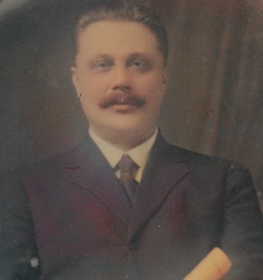Ferdinand Brak – Family Roots to America via his Grandson, Bronislaw Kalski
FERDINAND BRAK’s FAMILY ROOTS TO AMERICA via HIS GRANDSON, BRONISLAW KALSKI
Let’s begin our journey with the family name of BRAK, spelled Braak, Brack, Braack, Bryk. The most likely explanation for the variation in spelling of this last the name can be attributed to the scribes who recorded the name. BRACK, BRAK is derived from German language and the German the word das Brack – and one of the meaning of this German word is small lake, pond; which means this family land was located in the wonderful land of deep forests and lakes.
It is very important to note that the information contained in this narrative was obtained from Lutheran records which was limited because the Lutheran Records remain to be researched, indexed and published. Overtime, clarification of names, dates, and places should become clearer.
My oldest known Brak ancestors are Ferdinand Brak (1813-1874) and his wife Suzanna Zagewki (in general all is possible as Zuzanna Zagiewka, Żagiewka,…) (1818-1878). Between 1839 – 1855, Ferdinand Brak and Suzanna Zagewki, married and lived in Johannisburg, Johannisburg, Ostpreussen, Deutschland know today as Pisz. The family were Lutherans and while living Johannisburg, Ferdinand Brak made his living as a Cooper.
Pisz (pronounced Peesh [pʲiʂ], previously also known as Jańsbork, German: Johannisburg) is a historic town in the Warmian-Masurian Voivodeship in northern Poland, with a population of 19,466 (2016). It is the seat of Pisz County. Pisz is situated at the junction of Lake Roś and the Pisa River.
https://de.wikipedia.org/wiki/Kreis_Johannisburg
https://en.wikipedia.org/wiki/Pisz#Etymology
As a cooper, Ferdinand Brak was highly skilled and responsible for crafting barrels, casks, and other containers used to store and transport goods. His trade was important in a time when agriculture was the primary means of sustaining the local economy. By crafting high-quality containers, Ferdinand helped ensure that crops could be stored properly for long periods of time. This was essential for ensuring that there was enough food available throughout the year, especially during the winter months when fresh produce was scarce. Coopers were often related to millers and innkeepers.
As German Lutherans, Ferdinand Brak ‘s family would have joined the Prussian Union of Churches as required by Frederick William III, King of Prussia. The King was determined to unify the Protestant churches, to homogenize their liturgy, organization and even to standardize their architecture. In a series of proclamations over several years the Church of the Prussian Union was formed, bringing together the majority group of Lutherans. The main effect was that the government of Prussia had full control over church affairs, with the king being recognized as the leading bishop.
There is evidence from one of the children’s Baptismal Record that Ferdinand Brak was enlisted in the Prussian Army in 1841. It is likely that this enlistment may have been a mandatory requirement under Prussian law which required all men to serve in the military.
Ferdinand Brak and Suzanne Zagewki had at least five children while living in Johannisburg, Ostprussia, they were:
Ferdinand Brak was born in 1839 and became a tradesman called a Miller and lived in the area until his death on 1 April 1917. A miller was someone who ground wheat and corn to make flour. Ferndinand Brak, like his father was part of everyday life in Johannisburg and later in Maly Plock providing the grain to make bread for the villagers. His name is listed on the list of conscripts for Mocare Commune. Interesting he was a miller making the flour and his father Ferdinand Brak was a cooper making the barrels and containers to store the grain and flour; as mentioned above, coopers were often related to millers and innkeepers.
Carl Brak, also spelled Carol (Karol), was born in Johannesburg, in an area today called Nida. His Baptismal Record indicates he was born 28 February 1841 and it is recorded that he died on 1 January 1929 in Maly Plock, Podlaskie, Poland. His name is listed on the list of conscripts for Mocarze Commune. On 6 February 1906 he married Bronislawa Oliasz and together they had six children. Some of their children moved to Canada, Australia, and the United States. It is interesting to note here that many Lutherans dissatisfied with the Prussian Union of Church moved to Canada and Australia; was Carl dissatisfied?
Ludwig Brak was born 18 August 1842 in Johannisburg, East Prussia. He died in 1911 in Lomza. At 3pm on January 30, 1872 in Lomza, Ludwig married Karolina Jeger and together they had seven children. In 1874, . Ludwig and his family were living in Wizna, Podlaskie, Poland. On April 18, 1911 at 4 pm. in the village of Rutki, Podlaskie, Poland, Ludwig Brak died at the age of 68 years old
Emilia Brak was born 4 June 1844 in Johannisburg, East Prussian and married Carl Wejrauch around 1864. At this writing there are no records for her death. She and Carl Wejrauch had five children.
Michael Brak was born 25 March 1846 in Johannesburg, East Prussia. At the time of this writing, no records can be found about his life and death.
Franciszek Brak was born in between 1846 – 1852. A record search did not reveal a birth or Baptismal record, however there is a reference in Carl Brak ‘s record that she was his sister and at the time of her marriage to Franciszek Kalski , her parents are listed in Geneteka as Ferdinand Brak and Zuzanna Z . Franciszek Brak was living with her parents in Burzyn, Podlaskie, Poland when she met my 2nd great grandfather Franciszek Kalski . She was his second wife. In 1907, her son Bronislaw Kalski brought his mother and brothers and sister to the United States. She lived in Baltimore Maryland until her death on 3 November 1939. She is buried in Holy Rosary Cemetery, located in Dundalk, Baltimore MD.
https://www.findagrave.com/memorial/56848617/albert-mieczyslaw-kalski
Augusta Brak was born in 1852 in Johannisburg, East Prussia. At 4pm on 23 November 1874 she married Adolf Herfort in Lomza, Podlaskie, Poland. Together they had seven children.
Karolina Brak was born in 1856. At the time of this writing, there are no records indicating marriage or death.
During this time in Kries Johannisburg, Ostprussia, Ferdinand Brack (spelling on the record) was sponsor (Godparent) to two of his borthers-in-law’s children: Carl Sagewka, son of Michael Sagewka and Louisa Kostka in 1843 and in 1845, Cathrina Sagewka daughter of Gotlieb Zagewka and Regina Mathews .
In 1858, records searched from Geneteka indicate that Ferdinand Brak and Suzanne Zagewki moved from Johannesburg, East Prussia and settled in the village of Stawiski, Podlaskie, Poland.
https://en.wikipedia.org/wiki/Stawiski
In addition to his work as a cooper, Ferdinand Brak was also an innkeeper. In a small community like Stawiski, the local inn was considered the hub of social activity. It was a place where people came together to share news and stories, to drink and enjoy a meal, and to build relationships. Ferdinand’s inn was no different, and it played an important role in fostering a sense of community and belonging among the villagers.
The importance of Ferdinand’s roles in the community cannot be overstated. As a cooper, he helped ensure that the local economy could thrive by providing farmers with high-quality containers for their crops. As an innkeeper, he helped bring people together and build a sense of community in the villages. His contributions were essential to the social and economic fabric of these small communities.
While living in Stawiski, Ferdinand Brak and Suzanne Zagewki had Marcin, born in 1858 and Edward born in 1859. At the time of this writing no records have been found to indicate marriage or death.
The journey of searching those who came before continues through the connection of Bronislaw Kalski, his mother Franciszek Brak Kalski, and his brothers and sister who immigrated to the United States in 1897.
My deepest appreciation and praises to Tadeusz Wysocki and others from PTG Geneteka for there invaluable help, translations, and guidance. Remember:
If you love your loved ones – leave the crumb of memory of them for eternity
THE FAMILY MAIN STORY:
https://narodowa.pl/exhibits/bronislaw-kalski/
Charles Henderson
0
0
0




